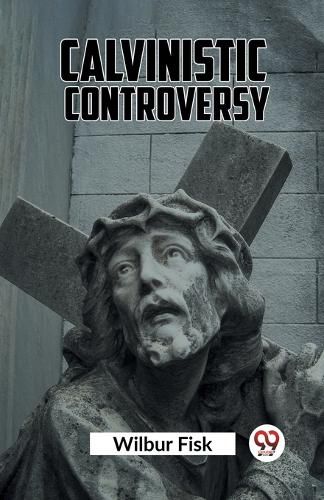Readings Newsletter
Become a Readings Member to make your shopping experience even easier.
Sign in or sign up for free!
You’re not far away from qualifying for FREE standard shipping within Australia
You’ve qualified for FREE standard shipping within Australia
The cart is loading…






This title is printed to order. This book may have been self-published. If so, we cannot guarantee the quality of the content. In the main most books will have gone through the editing process however some may not. We therefore suggest that you be aware of this before ordering this book. If in doubt check either the author or publisher’s details as we are unable to accept any returns unless they are faulty. Please contact us if you have any questions.
"Calvinistic Controversy" through Wilbur Fisk delves into the theological debates surrounding Calvinism and Arminianism in the course of the early 19th century, offering a nuanced exploration of the tensions between predestination and human loose will within Christian doctrine. Wilbur Fisk, a distinguished American Methodist theologian and educator, emerges as a key parent on this doctrinal discourse. Fisk's work, grounded in his dedication to Arminian theology, demanding situations the winning Calvinistic perspectives of predestination and election. In his book, Fisk meticulously dissects the theological underpinnings of Calvinism, advocating for an opportunity attitude that emphasizes human company in salvation. He posits that God's grace is universally available, and salvation is contingent upon a responsive religion as opposed to predetermined divine election. The "Calvinistic Controversy" turns into a platform for Fisk to articulate a more inclusive imaginative and prescient of God's grace, maintaining that salvation is open to all who pick out to accept it. His writings make a contribution drastically to the theological panorama of American Methodism, reflecting the broader diversity of doctrinal perspectives in the Christian community. Fisk's enduring legacy lies in his passionate defense of Arminian theology and the impact of his contributions on the theological discourse of his time.
$9.00 standard shipping within Australia
FREE standard shipping within Australia for orders over $100.00
Express & International shipping calculated at checkout
This title is printed to order. This book may have been self-published. If so, we cannot guarantee the quality of the content. In the main most books will have gone through the editing process however some may not. We therefore suggest that you be aware of this before ordering this book. If in doubt check either the author or publisher’s details as we are unable to accept any returns unless they are faulty. Please contact us if you have any questions.
"Calvinistic Controversy" through Wilbur Fisk delves into the theological debates surrounding Calvinism and Arminianism in the course of the early 19th century, offering a nuanced exploration of the tensions between predestination and human loose will within Christian doctrine. Wilbur Fisk, a distinguished American Methodist theologian and educator, emerges as a key parent on this doctrinal discourse. Fisk's work, grounded in his dedication to Arminian theology, demanding situations the winning Calvinistic perspectives of predestination and election. In his book, Fisk meticulously dissects the theological underpinnings of Calvinism, advocating for an opportunity attitude that emphasizes human company in salvation. He posits that God's grace is universally available, and salvation is contingent upon a responsive religion as opposed to predetermined divine election. The "Calvinistic Controversy" turns into a platform for Fisk to articulate a more inclusive imaginative and prescient of God's grace, maintaining that salvation is open to all who pick out to accept it. His writings make a contribution drastically to the theological panorama of American Methodism, reflecting the broader diversity of doctrinal perspectives in the Christian community. Fisk's enduring legacy lies in his passionate defense of Arminian theology and the impact of his contributions on the theological discourse of his time.